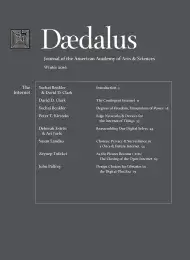As the Pirates Become CEOs: The Closing of the Open Internet
The early Internet witnessed the flourishing of a digitally networked public sphere in which many people, including dissidents who had little to no access to mass media, found a voice as well as a place to connect with one another. As the Internet matures, its initial decentralized form has been increasingly replaced by a small number of ad-financed platforms, such as Facebook and Google, which structure the online experience of billions of people. These platforms often design, control, influence, and “optimize” the user experience according to their own internal values and priorities, sometimes using emergent methods such as algorithmic filtering and computational inference of private traits from computational social science. The shift to a small number of controlling platforms stems from a variety of dynamics, including network effects and the attractions of easier-to-use, closed platforms. This article considers these developments and their consequences for the vitality of the public sphere.
I traveled to Cairo in the spring of 2011, a few months after the fall of President Hosni Mubarak. Egypt was unsettled but jubilant, and the rest of the Middle East had not yet fallen into war or renewed authoritarianism. One of the Egyptians I interviewed was a blogging pioneer whom I will call Hani.1 In the early 2000s, Hani had been among the first to take advantage of the burst of freedom experienced by Egyptians before the authorities fully caught on to the Internet’s revolutionary potential. Many bloggers made it through the Mubarak era largely unscathed because the government could not keep up with or fully understand the new medium. Unfortunately, Hani had caught the attention of the government; he was tried and sentenced to years in prison for the crime of insulting Mubarak. Throughout his imprisonment, he remained defiant. He was released in November 2010, just months before a Facebook page would spark a revolution that would dramatically change the country, the region, and the world.
Before going to jail, Hani felt that his blog had been a bustling crossroads of discussion. His voice reached . . .
